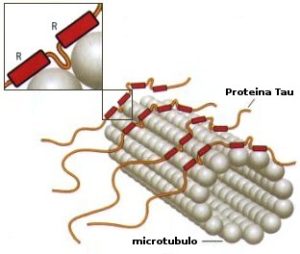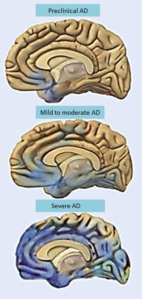
Credit: Wikipedia.org
Alzheimer’s disease is a well-known disorder that affects 5.4 million Americans. Yet there are currently only four drugs available that treat its symptoms. Unlike cancer treatments, which are varied, plentiful and targeted to specific forms of the disease, Alzheimer’s drugs are rare. This is largely because scientific researchers still know very little about the disease.
It’s not for lack of trying. Drug developers go through a grueling approval process that can take years to complete. Yet in the end, 99 percent of all Alzheimer’s drugs never make it past clinical trials.
Why is it so difficult to find treatments for Alzheimer’s disease? One reason is that doctors and researchers don’t know enough about the biomarkers for Alzheimer’s. Biomarkers are substances or organisms that signal the presence of a disease. For example, if doctors find high levels of antibodies to a virus in your blood, it’s a sign that you have the virus. Similarly, many cancer cells contain genetic material that indicate the presence of a specific type of cancer.

Credit: Wikimedia.org
Right now, researchers can only identify two types of protein that signal Alzheimer’s in the brain. Amyloid beta proteins cause plaque buildup on the brain. And tau proteins become more plentiful in the brain the longer the disease progresses.
However, these proteins are very hard to find. Dr. Maria Carrillo told Business Insider, “To find one protein in the brain is to find a grain of sand in a kiddie pool.” Tau proteins are particularly difficult to locate. And by the time they are plentiful enough for doctors to identify them, it is often too late for the patient to receive effective treatment.

Credit: Wikimedia.org
As a result, most doctors rely on behavioral clues to diagnose patients with Alzheimer’s disease. These include severe memory loss, changes in cognition, confusion (especially about time or place), vision problems, verbal communication issues, and sudden changes in mood or personality, among many others.
Unfortunately, many of these symptoms are also normal signs of aging. It’s not until they become severe that patients and their families suspect that Alzheimer’s is to blame. Thus, early diagnosis is difficult. What’s more, it’s possible that researchers are testing potential Alzheimer’s treatments of people who don’t have the disease, leading to the rejection of potentially useful drugs.
This is why researchers are focused on biomarkers, which would allow for more effective screening and earlier intervention — ideally before behavioral symptoms start.

 Finding Alzheimer’s Drugs is Harder Than You Think
Finding Alzheimer’s Drugs is Harder Than You Think



 ”The Snow Sister” Directed by Cecilie Askeland Mosli
”The Snow Sister” Directed by Cecilie Askeland Mosli















